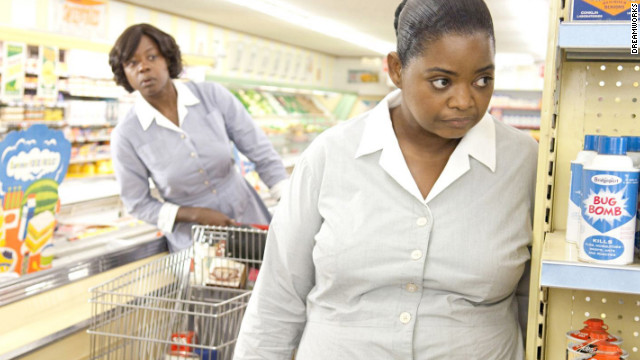The world feels different right now and content is being viewed through a different lens.
With conversation in our culture focused on systematic racism and the treatment of black people after the death of George Floyd while in the custody of Minneapolis police, some are reevaluating Hollywood's on-screen depictions of racism.
And we have to tell you, some of them have not aged well.On the heels of the news that HBO Max has pulled "Gone with the Wind" to add "historical context," here are a few films that probably aren't the most helpful if you are trying to learn more about race and racism:
"The Help" (2011)
Twitter was seething after the film directed by Tate Taylor and based on the same-named 2009 novel written by Kathryn Stockett started trending as protests sprung up following Floyd's death.
There were concerns even before the movie was released.
Partly because Taylor is a white man, who was tasked with shepherding a story about a pair of black maids, Aibileen Clark (played by Viola Davis) and Minny Jackson (played by Octavia Spencer), set in Jackson, Mississippi during the Civil Rights Movement.
Those voices grew louder after the film hit theatres, as many complained that it focused more on the white character of Eugenia "Skeeter" Phelan (played by Emma Stone).
And while her performance won Spencer a best-supporting actress Oscar, Davis has since said she regrets taking the role.
"I just felt that at the end of the day that it wasn't the voices of the maids that were heard," Davis told the New York Times in 2018.
Earlier this week, Bryce Dallas Howard, who played Hilly Holbrook in "The Help," suggested ten other films to consider viewing to better learn about America's history of racial inequity.
"The Legend of Bagger Vance' (2000)
Directed by Robert Redford and starring Will Smith, Matt Damon, and Charlize Theron, "The Legend of Bagger Vance" has been slammed repeatedly for furthering the "magical Negro" trope.
That terminology was made popular in the early aughts by black director Spike Lee and refers to Hollywood's use of a black character who serves to make the lives of white characters better.
In some cases the black character possesses supernatural qualities, as is the case with Smith's character in the film, the mysterious golf caddy, Bagger Vance.
"Blacks are getting lynched left and right, and [Bagger Vance is] more concerned about improving Matt Damon's golf swing," Lee said during a 2001 talk at Yale.
"Green Book" (2018)
Critically acclaimed (it won a best picture, best original screenplay and star Mahershala Ali won best supporting Oscar), the film was also highly controversial.
Set in 1962, Ali plays musician Dr Donald Shirley opposite Viggo Mortensen as his driver and bodyguard, Tony Vallelonga, in a dramatization of the pair's real life friendship.
Member's of Shirley's family complained that the film was a "symphony of lies" in terms of his portrayal as estranged from his family.
"That was very hurtful," his nephew Edwin Shirley III told Shadow & Act. "That's just 100% wrong."
There was also criticism that the movie's plot helped further the "white saviour" cinematic trope, something the film's director and co-writer Peter Farrelly told Vanity Fair.
"These guys help each other," Farrelly said. "Tony Lip gets Don Shirley out of some earthly problems, but Don Shirley saves Tony Lip's soul."
"Song of the South" (1946)
Disney + declined to release "Song of the South" as part of their classics with the streaming service debuted.
The combination animated and live-action film offers up what are now viewed as stereotypical and offensive portrayals of African Americans -- ranging from the black character's dialect to their subservience to white characters.
The plot centres around a boy named Johnny (played by Bobby Driscoll), who is educated and entertained by lessons taught to him by a former slave named Uncle Remus (told by James Baskett).
"Even the animated sequences aren't free of controversy," CinemaBlend noted. "One of Br'er Fox's plans to capture Br'er Rabbit involves the use of a golem made of black tar which the fox refers to as a ...tar baby."
Latest Stories
-
Man remanded for uploading nude videos of a lady he lured into a relationship
1 hour -
Explainer: What is the Cash Waterfall Mechanism?
1 hour -
Survivors of child trafficking overcome adversity, excel in tertiary education
2 hours -
Confront the barriers to your progress – Professor Lydia Aziato challenges the youth
2 hours -
Expertise France leads EU-funded initiative empowering African Journalists to combat human trafficking
3 hours -
Ghana Grows Programme empowers Ghanaian youth through Youth Policy Dialogue
3 hours -
Eastern NDC raises GHS5.4m to support Mahama’s 2024 campaign
3 hours -
Kumawood actress Akyere Bruwaa condemns death rumours
3 hours -
Ghana Institution of Engineering calls for proactive measures to prevent flood disaster
3 hours -
Who pays for the extra cost? – COCOBOD CEO questions EU on new regulations
3 hours -
‘Dumsor’ will be over by end of May – Former NPP MP assures
4 hours -
Power crisis is not about money – NPP Manifesto Committee member
4 hours -
Education Minister urges graduates to embrace opportunities
4 hours -
UN rights chief ‘horrified’ by mass grave reports at Gaza hospitals
4 hours -
We need more resources to deal with flooding – NADMO
4 hours

